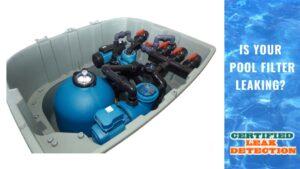
We depend upon the machines in our life to function dependably and smoothly. When they don’t, we tend to know about it quickly, if not immediately. The car stops running, food thaws and spoils when the fridge conks out, etc. A pool filter is somewhat different, however. It can develop a leak without you being aware of the issue for some time. And when you do notice that something’s not quite right, the source of the problem isn’t always obvious. Learning how to recognize signs of trouble before the situation becomes worse can save you the expense of an even more costly repair!
But first, let’s cover the basics.
The Function and Components of a Pool Filter
Simply put, the pool filter’s main function is to filter out debris so that the pool’s water remains clean. A pool filtration system is made up of a pump and a filter. The pump pulls the water from the skimmer(s) located on the pool wall, as well as the main drain(s) on or near the bottom area of the pool.
The water then flows through the pump to the filter, which removes debris, dirt and bacteria. After the water is filtered, clean water flows through the plumbing and returns to the pool through the return jets on the pool walls.
There are three types of pool filters, which Alliance Pools & Patio describe as follows:
Cartridge filter – This type of filter makes use of cartridges, which are big sheets of polyester cloth or paper folded accordion-style, to catch debris. Some of these filters require a single cartridge, while others may need multiple cartridges.
Sand filter – A sand filter is nothing but a tank full of sand. Slotted lateral pipes at the bottom disperse water evenly through the sand to catch debris.
Diatomaceous Earth (D.E.) filter – D.E. filters use eight to 10 filter grids covered in D.E. powder (which is basically fossil dust) to catch debris.
Pool Filter Trouble Signs
As mentioned earlier, knowing what conditions to look for is essential in identifying a bad pool filter, as there may not be one single event that indicates filter trouble. Typical trouble signs include the following:
The water turns cloudy – This could be due to lack of proper filtration, sanitation, or circulation and needs to be checked immediately.
Dirt and debris are being blown back into the pool – This indicates dirty or bad laterals, which are the small tubes in the bottom of your filter that help to catch and remove dirt and debris.
Pressure issues – The pressure gauge of the filter valve must read normal when the filter is running. When the filter is turned on, the valve should not read ‘0’. If the pressure is higher than normal, it means that the pool filter is dirty.
Loud noises – This could indicate motor problems in your filter, leading to performance issues.
Types of Pool Filter Problems
Unfortunately, pool filter problems manifest in many ways. Fortunately, the good people at Pool Stop describe the most common.
Leaking at the inlet/outlet – If the filter is leaking at the bulkhead fittings (the fittings to which the backwash valve attaches), there are two possible solutions:
- If the bulkhead fitting has a nut inside the tank, the filter will have to be taken apart to replace the gaskets, and the nut re-tightened.
- If the bulkhead fitting threads into the tank itself, you may be able to tighten it from the outside. Should this not work, installing new O-rings may be necessary.
Leaking multi-port valves – Usually the cause for this is the small O-rings on the multiport valve rotor becoming unseated or having debris get stuck there. Simply clean and reseat the O-rings. Be sure to apply silicone lubricant.
Leaking at the center of the tank – If the filter is leaking at the center where the two halves come together, the filter needs to be taken apart and serviced. Should you do this yourself and the filter continues to leak, check for a hairline crack around the flange of the tank half. If you have a crack, then the filter will need to be replaced.
As Pool Stop notes, “On some older stainless steel tanks, the sealing surfaces can become corroded and unable to seal. In this case, the filter also should be replaced.”
Cracked pool filter – For all practical purposes, this problem is beyond fixing. “If your filter body is cracked then it is definitely time for a new filter, especially if your filter is over 5 years old. On some filters, you can find a new tank half, but it is usually very expensive (at least half the cost of the filter) and it is a gamble. If the filter is old enough that one half has cracked, how long will it be until the other half also cracks? And then there are other things that can go wrong also.
“If you have a cracked tank, it is almost always best to go ahead and replace the entire filter. The only exception would be perhaps on a filter that is only a few years old and where the problem was not a product of old age of the tank.”
Don’t Let a Leaking Filter Spoil Your Fun
While the purpose of a pool pump may seem relatively uncomplicated, its components need to be in good working order to keep your pool a source of fun and recreation. Our blog post – “What You Need to Know About Your Pool Pump” – covers other common issues, as well as a basic maintenance program. And our blog post – “Common Causes of Pool Leaks” – provides more information on this topic.
Although we don’t repair or maintain swimming pools, Certified Leak Detection wants you to get the most from your slice of Central Florida paradise! If you can’t locate the source of a leak – or suspect that your pool has a leak – call us! We use technology and techniques we’ve developed over 20 years in business. In addition to quick detection of pool leaks, we provide industry-leading leak detection for spas and hot tubs.
Serving areas throughout Central Florida – including Orlando, Longwood, Lake Mary, Sanford, Kissimmee, Clermont and Winter Springs – our team is ready to answer your call. Contact us for quick, reliable service!

